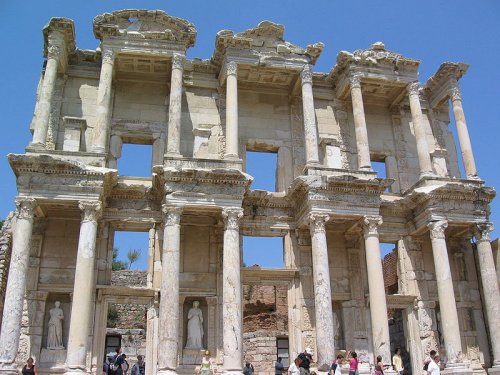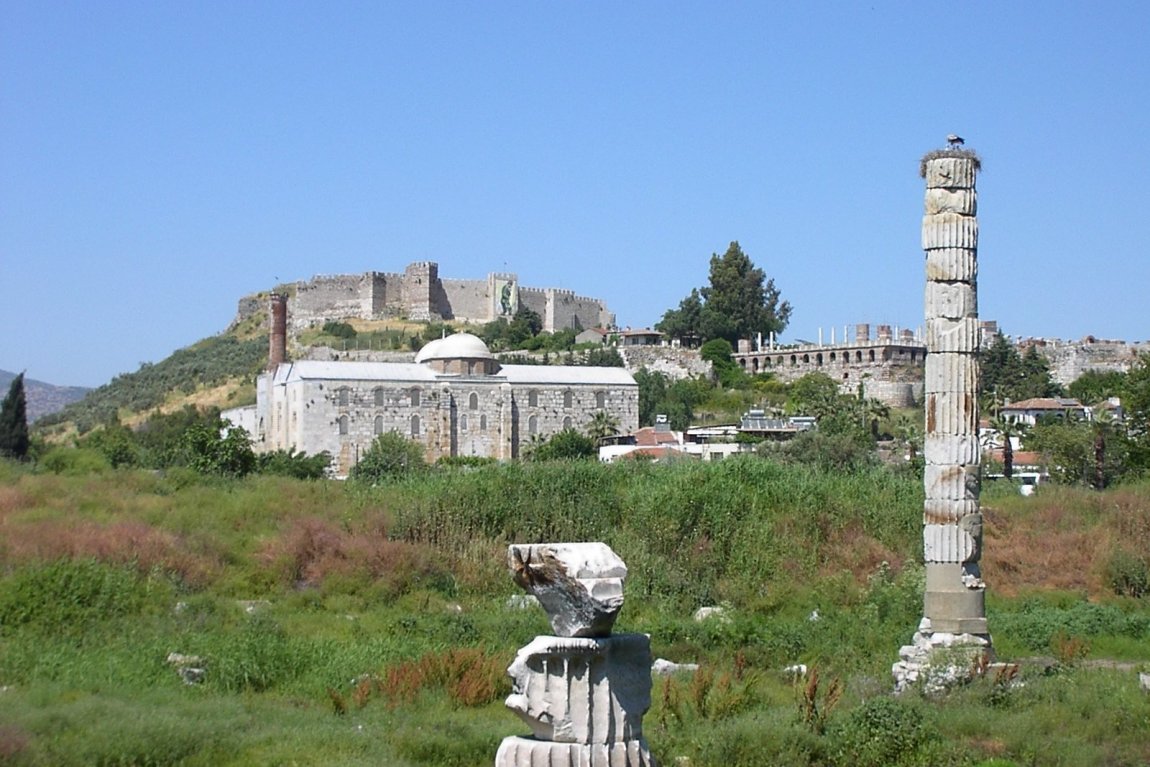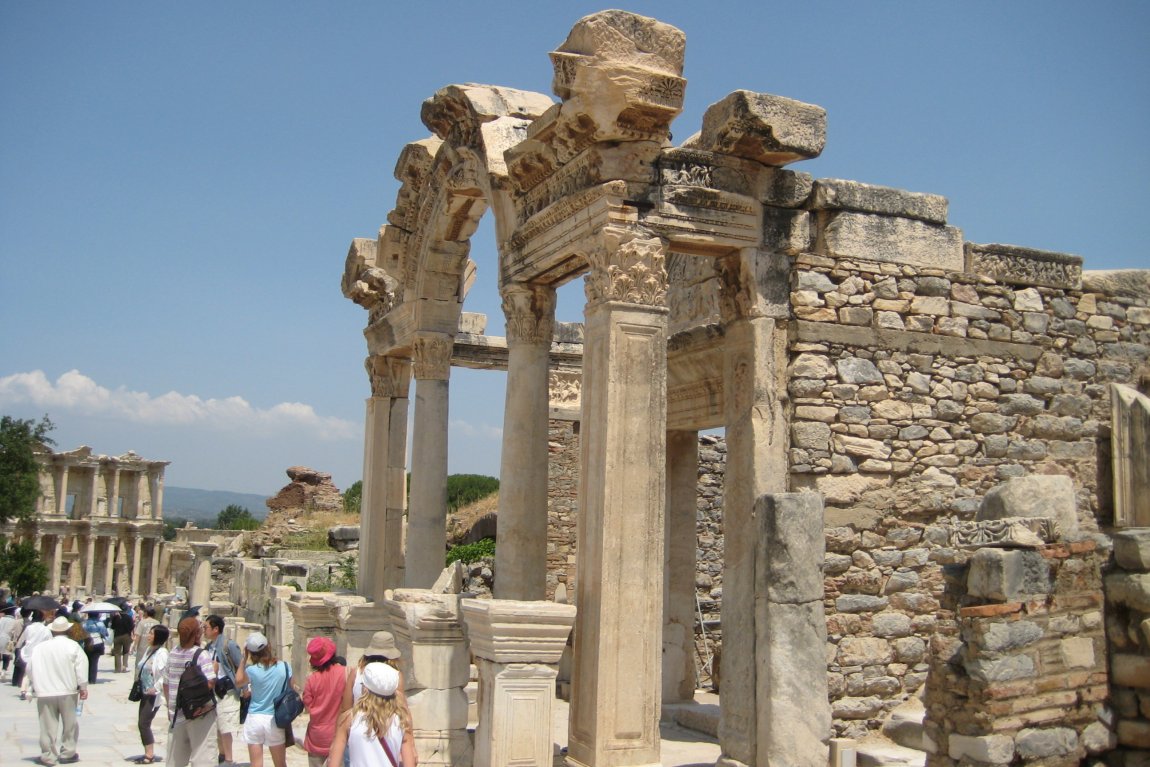
 Celsius Library, Ephesus, Turkey
Celsius Library, Ephesus, TurkeySource: https://commons.wikimedia.org/wiki/File:Celsius_Library,_Ephesus,_Turkey.jpg
Author: Julien LOZELLI
Author: Julien LOZELLI

Ephesus (Ἔφεσος) is an ancient Greek city in Asia Minor. Today the archaeological site is located near the modern Turkish city of Selçuk in Izmir Province. At one time, it had a population of 250,000 people and was the second largest city in the world. In its long history, it was inhabited and colonized by various peoples including the Greeks and the Romans. Today however, it is just a collection of ruins located about 3 km to the southwest of the town of Selçuk, in Izmir Province, Turkey.
The area around Ephesus has seen human habitation going back to the Neolithic Age, some 6,000 BC. Archaeological excavations have yielded traces of early settlements from the early Bronze Age at the Ayasuluk Hill, a burial ground from the Mycenaean era (1500-1400 BC) near the ruins of the basilica of St John, and many other pre-historic sites.
 Site of the Temple of Artemis, Ephesus, Turkey
Site of the Temple of Artemis, Ephesus, TurkeySource: https://commons.wikimedia.org/wiki/File:Ac_artemisephesus.jpg
Author: Adam Carr
Author: Adam Carr

During the Dark Ages, in the 10th century BC, Ephesus was a colony founded by Androklos, a prince of Athens. The Temple of Artemis, an ancient Greek temple dedicated to the Greek goddess Artemis was built here. It was rebuilt three times before being destroyed completely in AD 401. During its time, it was one of the Seven Wonders of the World. The site of the temple was rediscovered in 1869 during an expedition sponsored by the British Museum and led by British archaeologist John Turtle Wood.
Ephesus featured prominently in the New Testament of the Holy Bible. It was the location of an early church. The Apostle Paul lived there between AD 52 and 54. He also wrote the Epistle to the Ephesians while being imprisoned in Rome in AD 62.
Ephesus was the site of the Councils of Ephesus of the early Christian Church, which include the First Council of Ephesus in AD 431, held at the Church of Mary, the Second Council of Ephesus in AD 449, and the Third Council of Ephesus, in AD 475.
 Temple of Hadrian, Ephesus, Turkey
Temple of Hadrian, Ephesus, TurkeySource: https://commons.wikimedia.org/wiki/File:Ephese_SEY04.JPG
Author: Seynaeve
Author: Seynaeve

There are a number of sights in Ephesus worth visiting today. The most famous is the Library of Celsus, built in AD 114-117 by Consul Gaius Julius Aquila for his father. Other sights include the Theatre, which was carved into the flank of Mount Pion, the Gate of Hercules, the Temple of Hadrian and the Colonnaded Street.
Getting there
Your base for exploring Ephesus is the town of Selçuk. From there, you can take a minibus or shared taxi (called dolmuş in Turkish).Sights in Ephesus
- Colonnaded Street
- Ephesus Theatre
- Gate of Hercules
- Library of Celsus
- Temple of Hadrian
 Latest updates on Penang Travel Tips
Latest updates on Penang Travel Tips
 Map of Roads in Penang
Map of Roads in Penang
Looking for information on Penang? Use this Map of Roads in Penang to zoom in on information about Penang, brought to you road by road.About this website

Dear visitor, thank you so much for reading this page. My name is Timothy Tye and my hobby is to find out about places, write about them and share the information with you on this website. I have been writing this site since 5 January 2003. Originally (from 2003 until 2009, the site was called AsiaExplorers. I changed the name to Penang Travel Tips in 2009, even though I describe more than just Penang but everywhere I go (I often need to tell people that "Penang Travel Tips" is not just information about Penang, but information written in Penang), especially places in Malaysia and Singapore, and in all the years since 2003, I have described over 20,000 places.
While I try my best to provide you information as accurate as I can get it to be, I do apologize for any errors and for outdated information which I am unaware. Nevertheless, I hope that what I have described here will be useful to you.
To get to know me better, do follow me on Facebook!
Copyright © 2003-2025 Timothy Tye. All Rights Reserved.

 Go Back
Go Back